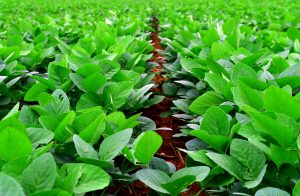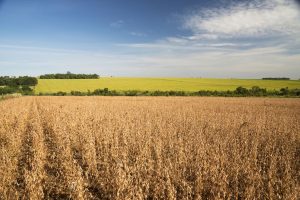At IDH, The Sustainable Trade Initiative we think daily about the influence that our industrial processes and trade has on people, economies and the environment. Forests are often at the heart of both livelihood and sustainability, and are impacted by the choices farmers, industries and governments make in their producing, sourcing, purchasing, and policies.

From baked goods and body creams to hamburgers and ice-cream, palm oil and soy play a big role in our day-to-day lives. Unsustainable production effects livelihoods and communities, and can destroy tropical forests and peatland. Sustainable production on the other hand offers development and trade opportunities, increases livelihoods and can incentivize forest protection.
Europe as the second largest global importer of palm and soy has the opportunity to lead the global economy towards fair and sustainable purchasing. With major stakeholders committed to 100% deforestation-free sourcing for palm oil and soy, Europe is already at the forefront of sustainable sourcing commitments, and progress has been made, despite the mix of forest protection, sustainable development and better livelihood being difficult to balance.

Industry-wide initiatives to halt deforestation like the Amazon Moratorium are successful. As a result of the moratorium, soy was responsible for less than .41% of deforestation in the Amazon in 2018. All this while increasing soy productivity on existing farmland. The Commitments and the Amsterdam Declaration on soy and palm oil are showing potential – they’ve included governments in destination markets as partner in the transition. At their most successful, government initiatives have radically shifted markets – Norway is now at 80% deforestation-free soy. Need further examples? European palm is now 99% traceable to the mill level, 84% of all palm oil is covered by company sustainability policies requiring ‘No Deforestation, No Peatland and No Exploitation’. And new market tools are making sustainable sourcing easier – like we at IDH are working with partners on a new sourcing mechanism called Verified Sourcing Areas that provides a solution for sourcing sustainable soy, palm oil, coffee and other commodities at a competitive scale and price.
These efforts are powerful, but the work is not yet done. This International Day of Forests, we call on the private sector, governments, and NGOs to step up action to help achieve responsible palm oil, soy and other commodities production and sourcing. With 2020 on the horizon, governments and industry need to work to dial up the demand for sustainable palm oil, soy, beef, cocoa and timber throughout the value chain. It’s not about being fixated on the 2020 deadline, it is not about being fixated on the European market, it is about meaningful change that can be scaled over the years to come. Only then will we reach mainstream solutions that benefit farmers, protect the forest and are for all sectors and markets.

Civil society please push for increased awareness, fair reporting, and worldwide policy development.
Manufacturers and retailers ensure you are at the forefront of these efforts – support producers that are working with legal, economically viable, environmentally conscious, and socially beneficial models of production.
Trade and other supply chain companies please step up the ongoing efforts to increase the traded volumes of responsible soy, stop sourcing from illegally deforested areas, and improve transparency.
And, we ask the financial sector to become an ever more active partner, investing in the transition towards mainstream sustainable commodity production.
All players must commit to empower (small) farmers to nurture their land, and work to source regionally to catalyze continuous improvement in farming practices.
It is only through our combined efforts that we will drive change and balance forest protection with the need to provide food and products to an ever growing world population while enabling farmers and communities all over the world to prosper.
Let’s make this International Day of Forests meaningful. Look up, see the forest, see the trees, and grow demand and investment for sustainable products to protect them.
Daan Wensing
IDH, The Sustainable Trade Initiative

